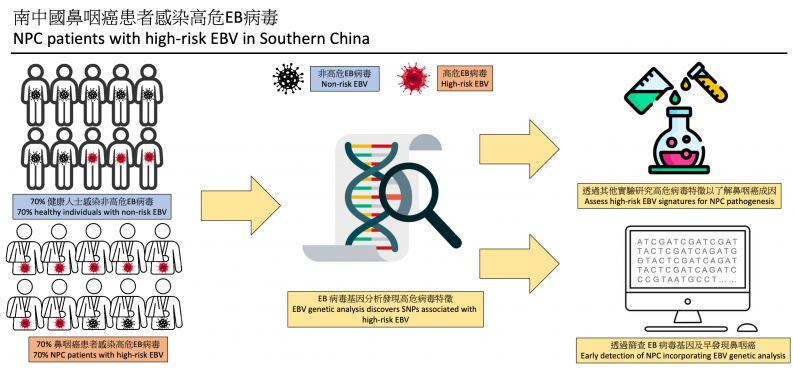Media
HKUMed meta-analysis links high-risk Epstein-Barr virus lineage to nasopharyngeal cancer in southern China
13 Nov 2024

HKUMed research finds that 70% nasopharyngeal cancer patients in Southern China harbor high-risk EBV.
Professor Alan Chiang Kwok Shing (centre) and Professor Yang Wanling (right) from HKUMed lead the research team in discovering a significant association between specific Epstein-Barr virus variants and nasopharyngeal cancer in Southern China.
HKUMed meta-analysis links high-risk Epstein-Barr virus lineage to nasopharyngeal cancer in Southern China.
- 1 / 3
- 2 / 3
- 3 / 3
Researchers at the LKS Faculty of Medicine of the University of Hong Kong (HKUMed) have discovered a significant association between specific Epstein-Barr virus (EBV) variants and nasopharyngeal carcinoma (NPC). NPC is a cancer notably prevalent in southern China, where it is 20 times more common than in non-endemic regions of the world. The findings, published in the journal PLoS Pathogens (link to publication), provide the basis for further scientific research and have potential application to population screening and diagnostic tests.
NPC, often referred to as ‘Cantonese Cancer’, affects predominantly 30- to 60-year-old men in southern China, including Guangdong and Hong Kong, and Southeast Asia. The cause is associated with various factors, including genetics, environment and viruses. The researchers emphasise that understanding the role of EBV in NPC’s pathogenesis is crucial since the virus has 100% association with this cancer.
Background
EBV has long been known to be closely associated with the development of NPC. However, recent research by principal investigators at HKUMed and Sun Yat-sen University Cancer Centre has shown that certain EBV variants might elevate the risk of individuals developing NPC, which is typically diagnosed at a late stage of the disease. Early detection will significantly improve the survival rate and reduce the long-term side effects of treatment, underscoring the importance of ongoing research and public awareness of the factors contributing to NPC.
Research results and significance
A HKUMed research team conducted a meta-analysis of genome-wide association studies (GWAS) of two datasets from Hong Kong and one dataset from Guangdong province, comprising a total of 279 and 227 EBV genomic sequences derived from NPC patients and healthy population carriers in Hong Kong and southern China, respectively. The study revealed high-risk EBV haplotype present in about 70% of NPC cases, compared to about 30% of population carriers. The use of nine genetic markers associated with a high-risk EBV lineage might help predict the presence of NPC, thus providing a potential new avenue for NPC screening and diagnosis.
Professor Alan Chiang Kwok Shing, the study’s principal investigator, from the Department of Paediatrics and Adolescent Medicine, School of Clinical Medicine, HKUMed, stated that the identification of a distinct high-risk EBV lineage offers valuable insight for future studies of disease mechanisms and the development of targeted screening and diagnostic tests of NPC in endemic regions, such as Hong Kong and southern China, ultimately improving patient outcomes.
‘By analysing extensive datasets surveyed in southern China, we confirmed the association of specific genetic variants near the EBER2 region of the EBV genome with NPC. These high-risk variants are tightly linked and form a broader risk haplotype,’ added Professor Chiang.
About the research team
The study was led by Professor Alan Chiang Kwok Shing and co-investigator Professor Yang Wanling, both from the Department of Paediatrics and Adolescent Medicine, School of Clinical Medicine, HKUMed. The key research team members are Dr Wong Ka-wo and Dr Hui Kwai-fung. Other collaborating researchers are Professor Dora Kwong Lai-wan and Professor Maria Lung Li, both from the Department of Clinical Oncology, School of Clinical Medicine, HKUMed.
Acknowledgements
The study was funded by the Health and Medical Research Fund of the Health Bureau, HKSAR government, and received support from the NPC Tissue Bank, under the Research Grants Council Areas of Excellence (AoE) Scheme, which provided additional NPC samples.
Media enquiries
Please contact LKS Faculty of Medicine of The University of Hong Kong by email (medmedia@hku.hk).
